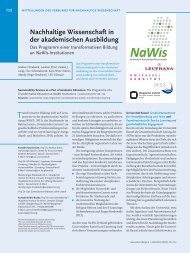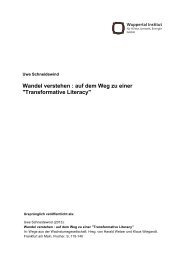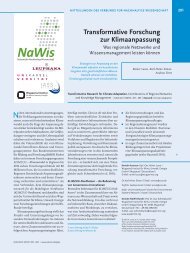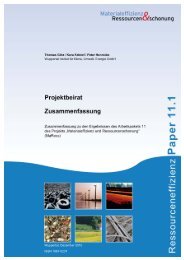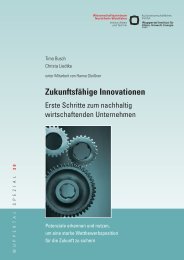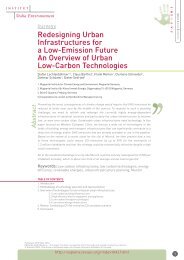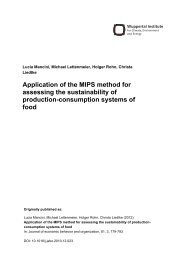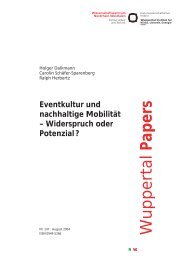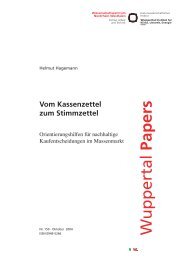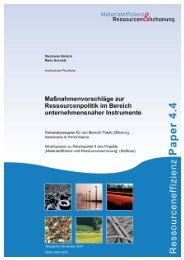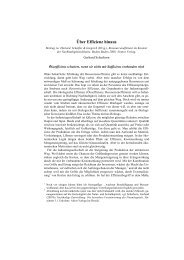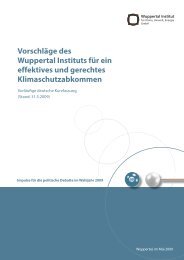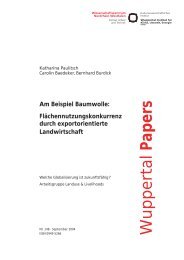Resource Efficiency Atlas - Publication Server of the Wuppertal ...
Resource Efficiency Atlas - Publication Server of the Wuppertal ...
Resource Efficiency Atlas - Publication Server of the Wuppertal ...
You also want an ePaper? Increase the reach of your titles
YUMPU automatically turns print PDFs into web optimized ePapers that Google loves.
2 <strong>Resource</strong> efficiency potentials<br />
in focus <strong>of</strong> research<br />
As described in chapter 1.2 <strong>the</strong> <strong>Resource</strong> <strong>Efficiency</strong> <strong>Atlas</strong><br />
aims at identifying and evaluating potentials arising from<br />
resource-efficient products and technologies with emphasis<br />
put on <strong>the</strong> integration <strong>of</strong> international perspectives.<br />
Chapter 2 begins with <strong>the</strong> presentation <strong>of</strong> international<br />
experts’ opinions on resource efficiency aspects.<br />
2.1 International experts’ perspective on resource efficiency<br />
As part <strong>of</strong> <strong>the</strong> project <strong>Resource</strong> <strong>Efficiency</strong> <strong>Atlas</strong> a number<br />
<strong>of</strong> interviews were held with international experts. The<br />
purpose <strong>of</strong> <strong>the</strong>se interviews was to obtain an overview <strong>of</strong><br />
<strong>the</strong> general understanding <strong>of</strong> resource efficiency, main po-<br />
tentials, possible prospective developments and obstacles,<br />
and success factors in <strong>the</strong> implementation <strong>of</strong> resource ef-<br />
ficiency in an international context. In total 17 interviews<br />
were conducted. A compilation <strong>of</strong> names and contact de-<br />
tails <strong>of</strong> <strong>the</strong> interviewed experts are listed in <strong>the</strong> appendix.<br />
The results <strong>of</strong> <strong>the</strong> survey, based on <strong>the</strong> four interview sec-<br />
tions “understanding and importance <strong>of</strong> resource efficien-<br />
cy”, “potential estimation <strong>of</strong> resource efficiency”, “possible<br />
future developments” and “cross-cutting <strong>the</strong>mes“ as well<br />
as “implementation <strong>of</strong> resource efficiency”, are presented<br />
in <strong>the</strong> following:<br />
Understanding and importance <strong>of</strong> resource<br />
efficiency (interview part 1)<br />
Within <strong>the</strong> context <strong>of</strong> major global challenges such as de-<br />
mographic trends, climate change, and resource scarcity,<br />
<strong>the</strong> interviews showed that resource efficiency is mainly<br />
considered as one <strong>of</strong> <strong>the</strong> key global strategies for economic<br />
The second part <strong>of</strong> this chapter includes <strong>the</strong> procedure<br />
for collecting international good practice examples <strong>of</strong><br />
resource efficient key products, technologies and strategies.<br />
It describes both findings and difficulties in terms <strong>of</strong><br />
identifying and evaluating <strong>the</strong>se examples. In addition, an<br />
overview <strong>of</strong> <strong>the</strong> results <strong>of</strong> <strong>the</strong> collected examples is given.<br />
activity. There is consensus on a tightened shortage <strong>of</strong> primary<br />
resources considering rapidly increasing demand for<br />
resources. There is a need for resource efficiency – a concept<br />
to achieve <strong>the</strong> same performance with geologically<br />
limited resources to serve <strong>the</strong> same number <strong>of</strong> people. The<br />
objective is to maximize <strong>the</strong> use <strong>of</strong> existing resources.<br />
According to <strong>the</strong> interviewed experts, already for decades,<br />
<strong>the</strong>re are a number <strong>of</strong> scientific publications and<br />
capabilities available in various disciplines concerning<br />
this topic. The publications illustrate possible instruments,<br />
methods, and solutions that can support <strong>the</strong> increase <strong>of</strong><br />
resource efficiency at different levels. Even in <strong>the</strong> public<br />
debate, <strong>the</strong> issue is on <strong>the</strong> daily agenda. For this reason,<br />
most <strong>of</strong> <strong>the</strong> experts agree that responsible resource management<br />
is fundamental. However, <strong>the</strong>re are differences in<br />
opinions concerning questions <strong>of</strong> implementation and several<br />
focal points. Here, <strong>the</strong> regional and discipline-related<br />
interests are natural determinants.<br />
Economic gains or benefits are <strong>the</strong> key driving factors for<br />
resource efficiency. In many countries, <strong>the</strong>re is concern<br />
about reducing dependencies on imported raw materials<br />
– hence, <strong>the</strong>y secure <strong>the</strong> control <strong>of</strong> resources and <strong>the</strong>ir<br />
Ressourceneffizienzatlas<br />
<strong>Resource</strong> <strong>Efficiency</strong> <strong>Atlas</strong> 11



